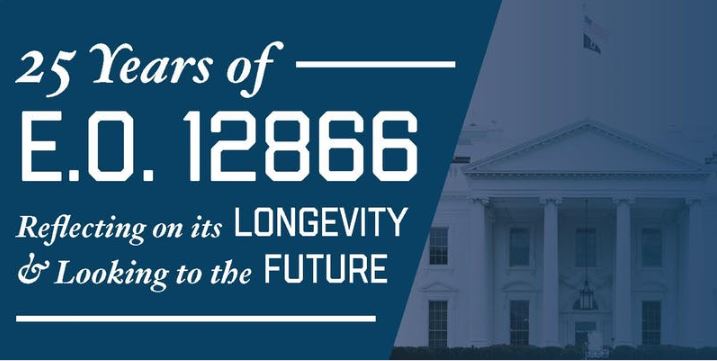
Advocacy Staff Attends Forum Celebrating 25 Years of E.O. 12866
By Nora Esposito, Economic Research Fellow
On September 24, 2018, Advocacy staff attended “A Forum Celebrating 25 Years of Executive Order 12866” at George Washington University (GW). The event was co-sponsored by the Society for Benefit-Cost Analysis, George Washington University Regulatory Studies Center, the Section of Administrative Law and Regulatory Practice of the American Bar Association and the Trachtenberg School of Public Policy & Public Administration at GW. The Forum convened several previous Office of Information and Regulatory Affairs (OIRA) administrators and leaders from academia and executive agencies for a discussion of the E.O.’s impact on rulemaking during its 25-year lifespan, as well as a look to the future of regulatory review.
E.O. 12866 provides an efficient regulatory process by requiring regulatory actions that are economically significant to go through an economic analysis and be submitted for review to OIRA in the Office of Management and Budget (OMB). The day’s events kicked off with a panel looking back on 25 years of E.O. 12866 moderated by Bridget Dooling, former senior OIRA analyst and GW Regulatory Studies Professor. OIRA Administrators from the Clinton, Bush, and Obama administrations as well as longtime agency career staff shared their views on why the E.O. has lasted so long. Sally Katzen, the Clinton administration’s OIRA Administrator, explained several reasons for the E.O.’s longevity: the regulatory principles were well-established and widely-accepted, and the administration worked hard to include input from various stakeholders during the initial drafting process. She emphasized the importance of establishing a meaningful back-and-forth and strong interagency relationships. Clark Nardinelli, Chief Economist at the Food and Drug Administration, proposed that E.O. 12866’s success can be accounted for by the specific language it uses in establishing good regulatory principles, which have helped in improving agency analysis and imposing minimal burden on society. Former Assistant General Counsel at the Department of Transportation Neil Eisner echoed the E.O.’s role in producing quality analysis and recognized OIRA’s role in increased interagency cooperation. John Graham, former OIRA Administrator during the Bush administration, said the E.O.’s strength in establishing best regulatory practices led to consideration of Congressional legislation. In addition, he explained that these best practices have led to the principles being used by other nations’ governments and organizations. Howard Shelanski, the Obama administration’s OIRA Administrator, outlined the importance of E.O. 12866 in economic analysis and specifically cost-benefit analysis as an important part of regulation evaluation.
The second panel featured Congressional Staffers Daniel Flores, Chief Counsel of the House Judiciary Committee, Subcommittee on Regulatory Reform and Commercial and Antitrust Law (Majority Staff), and Anthony Papian, Professional Staff, Senate Homeland Security and Government Affairs Committee and Subcommittee on Regulatory Affairs and Federal Management (Minority Staff). Shawne McGibbon, General Counsel of the Administrative Conference of the U.S. and former Acting Chief Counsel at the Office of Advocacy, served as moderator. Flores began by explaining how E.O. 12866 and the Administrative Procedure Act, in tandem, have produced high-quality products. Papian agreed that the E.O. has been an effective tool as it has allowed agencies to rely on the repository of specific knowledge and expertise, producing high-quality rules. The two panelists emphasized the importance of both ex-ante and ex-post review before discussing opportunities for possibly codifying regulatory processes based on E.O. 12866’s principles. The conversation reinforced the first panel’s discussion of strong bipartisan support.
The final panel featured John Cooney, former Chair of the American Bar Association’s Section of Administrative Law and Regulatory Practice and former OMB Deputy General Counsel, as moderator and focused on the future of E.O. 12866. Current OIRA Administrator Neomi Rao recognized the bipartisan consensus and support that the E.O. has garnered despite various administration’s differing policy goals. Rao expressed the need for careful consideration of free markets, private choices and the need for government action when making the choices of when and how to regulate. Acting Consumer Product Safety Commission (CPSC) Chair Ann Marie Beurkle explained that though CPSC is not subject to the E.O., she is favorable towards the practices established by the E.O. The panel continued in lively conversation when Richard Revesz, Professor of Law and Dean Emeritus at NYU Law School, voiced concerns over President Trump’s E.O. 13771 emphasis on cost savings. Rao responded that 13771 encompasses a net cost-benefit test consistent with E.O. 12866, which can improve regulatory review in a retrospective sense. Director of GW Regulatory Studies Center and former OIRA Administrator Susan Dudley affirmed Rao’s earlier statements about the importance of retrospective review, which agencies should anticipate and plan for from the outset. In addition, she posited the importance of humility in regulation, highlighting the importance of reflecting upon whether there is a compelling public need and whether government intervention is needed and on what can actually be accomplished by regulation.
Though the policy goals of different administrations have differed over the past 25 years, E.O. 12866 has remained a constant guide. E.O. 12866 has made significant contributions towards sound regulations and meaningful regulatory review process. It appears clear that the future of regulation is one with the principles and practices of E.O. 12866.
